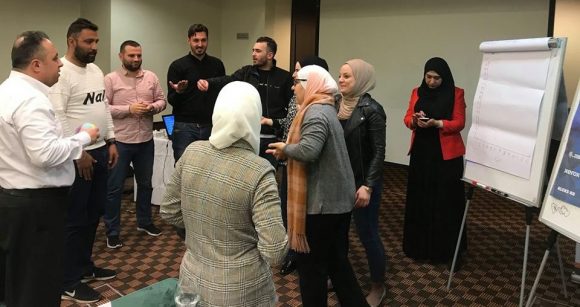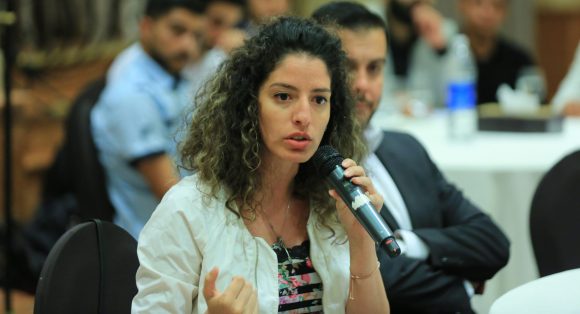NIMD Jordan: Our work to support young people to engage in politics

As more and more of NIMD’s programmes go online in response to the COVID-19 pandemic, our work to support youth in Jordan is going strong.
In Jordan, 70% of the population is under 30. Yet the country sees very little political participation from this age group.
One of our aims is to make it possible for youth to participate in politics. We work with young people to increase their participation in politics and elections, and make sure they can voice their opinion through their elected representatives.
Keeping our work going
Of course, like many around the world, the way we work has been greatly affected by the Coronavirus crisis. Since the lockdown in Jordan, we have taken our work online, so that we can continue to make progress.
Empowering young people with new skills and knowledge
NIMD runs training for young politicians and civil society representatives through our “EU Support to Jordanian Democratic Institutions & Development (EU-JDID)” programme and the Jordan School of Politics (JSoP).
Through these programmes, we provide young people from across Jordan’s political spectrum with knowledge and skills to enhance their political participation. It’s about sharing knowledge between aspiring young politicians in the country and helping them to learn from each other’s experiences.
This year’s edition of both the EU-JDID youth training and JSoP were launched shortly before the COVID-19 crisis hit Jordan. The participants were able to continue their training through interactive online workshops.
“This was my first virtual training. It went beyond my expectations. We may ask for more virtual trainings even if life returns as it was before the pandemic.” Oday Omoush, civic activist and EU-JDID youth training participant.
The EU-JDID training aims to encourage young citizens to engage with political parties and enhance their participation in the political process. The classes have focused on political engagement, supporting the young participants as they develop and articulate their views through debates and dialogue.
The participants have honed their skills to influence public opinion and share the principals of inclusive politics among their peers.

Similarly, the JSoP participants have built their knowledge about how the political system works; how public decisions are made; what their rights are as citizens; and where and how they can access political processes.
In addition, with elections currently scheduled for later this year, the participants have also developed an understanding of the electoral system. They have studied the voting system in Jordan, and the rules underpinning elections and referenda, as well as comparing the system in Jordan to others around the world.
If the COVID-19 situation permits, the JSoP participants will have the chance to get involved in Jordan’s parliamentary elections. This represents an excellent opportunity for the participants to take up hands-on roles, including campaigning for candidates, providing information for voters, or holding debates.
Part of NIMD’s ambition is to work towards peaceful elections in our programme countries.
As well as providing new opportunities, knowledge and skills, the online workshops for both JSoP and EU-JDID have encouraged cooperation between the participants. As always, our training for youth has brought together young people from different backgrounds and counties, and, most importantly, people who held different political and ideological beliefs.
They are encouraged to connect, and start to build a network of young political actors keen to make a difference in their communities.
Training and online debate
In parallel to the JSoP classes, NIMD has also been holding online debates and discussions on the participation of young people in politics.
For example, young people were able to engage in discussion with Jordan’s Minister of Political and Parliamentary Affairs, Moussa Al-Maayta. They delved into the impact of citizenship education on political engagement among the youth.
Together, they discussed how can citizenship and political participation in Jordan be improved, and how to emphasis its role during times of crisis,
A second discussion explored how young people can make a difference in politics. The participants discussed how to encourage young people to express themselves, interact with political powerholders and show their skills.
A focus on young women
NIMD Jordan is also running a coaching programme for young women who aspire to run in future elections. The coaching, which runs from April to October 2020, targets 15 women leaders.
These leaders are receiving coaching from highly skilled mentors on effective political engagement.

With their designated mentor, the potential candidates learn skills to overcome the barriers to their careers, according to their individual needs and motivation to compete in upcoming parliamentary, local or party elections.
In addition, through their work with the mentors and fellow candidates, the participants are able to build a network of high-powered people to provide advice and guidance through their campaign and in their future political career.
Continuing the progress on youth in politics
NIMD is proud to continue providing the opportunity for young people in politics to learn about, and become involved in their country’s politics. Even through this crisis, we have continued encouraging and enabling youth to create change in the political structures and culture that they see around them.
We are constantly looking at new ways to provide this support. On 22 June, for example, NIMD Jordan and the Jordanian Ministry for Youth agreed to launch a new project together. This project will aim to enhance youth participation in Jordan’s 2020 elections, and will be implemented over the course of this summer.
It is clear to us, in every country we work in, that democracy needs strong and committed people to hold it up. By empowering young people to take up that role, we hope to contribute to more openness and inclusiveness in politics for years to come.